
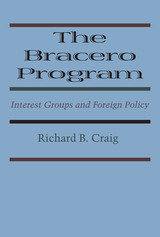
Long before “Cesar Chávez” and “Chicano” became commonly known, the word “bracero” had established itself in the language of American politics. The Mexican Farm Labor Program—or bracero program as it came to be known—was from its inception in 1942 a highly controversial issue. At international, national, and subnational levels, it remained the focal point of an intense interest-group struggle. This struggle and its group combatants provide the central concern of this study.
In the early 1940’s agribusiness interests had sought to contract Mexican laborers (“braceros”) for work on United States farms. With the entry of the United States into World War II, legislation was passed for contracting braceros on a large scale. What was originally a wartime measure soon became an institution. During twenty-two years, 4.2 million braceros were contracted. The United States, at the insistence of the Mexican government, became a partner in the program, ensuring that the braceros were provided housing, set wages, and other benefits.
The program was, however, detrimental to one group in the United States: the native farmworker. Not only was the bracero provided guarantees that the native could not demand, but the bracero also got the native’s job.
During the late forties and fifties, organized labor gathered its forces in Congress to oppose the program. Finally, an administration favorable to the native farmworker threw its support behind the native laborer, and through the Department of labor measures were passed that made it less attractive to hire foreign labor.
In the end, the anti-bracero forces won out in Congress and defeated extension of the Mexican Farm Labor program. At the same time, the United States government, by setting the working standards for foreign workers, brought about an improvement in the working conditions and wages of native farm laborers.
Besides the conflicts between domestic interests, Craig examines the international conflicts and issues involved, as well as the international agreements that were the basis of bracero contracting. He discusses with perception the program’s immediate and long-range effects on Mexico. His study analyzes and clarifies one of the most controversial domestic and international programs of the twentieth century.
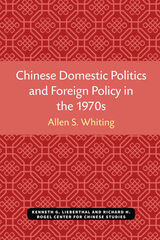
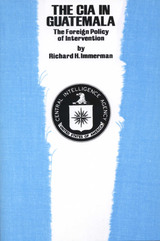
Using documents obtained through the Freedom of Information Act, recently opened archival collections, and interviews with the actual participants, Immerman provides us with a definitive, powerfully written, and tension-packed account of the United States' clandestine operations in Guatemala and their consequences in Latin America today.

At the age of twenty-two, Andronicus II became sole ruler of Byzantium. His father, Michael VIII, had been a dashing figure--a good soldier, brilliant diplomat, and the liberator of Constantinople from its fifty-seven-year Latin occupation. By contrast Andronicus seemed colorless and ineffectual. His problems were immense--partly as a result of his father's policies--and his reign proved to be a series of frustrations and disasters.
For forty-six years he fought to preserve the empire against constantencroachments. When he was finally deposed in 1328 by his grandson and co-emperor, Andronicus III, almost all of Asia Minor had been lost to the Turks, Westerners had taken over the defense of the Aegean, and the Catalan army he had invited to help him fight the Turks remained to fight the emperor.
In this penetrating account of Andronicus' foreign policy, Angeliki E. Laiou focuses on Byzantium's relations with the Latin West, the far-reaching domestic implications of the hostility of western Europe, and the critical decision that faced Andronicus: whether to follow his father's lead and allow Byzantium to become a European state or to keep it an Eastern, orthodox power.
The author, who argues that foreign policy cannot be understood without examining the domestic factors that influence, indeed create, it, devotes a large part of her study to domestic developments in Byzantium during Andronicus' reign-the decline of the power of the central government; the spread of semi-independent regional authorities; the state of finances, of the army, of the church.
She concludes that, contrary to common opinion, Andronicus II sincerely desired the union of the Greek and Latin churches, when, in the last years of his reign, he realized that the political situation made such a union necessary. Maintaining also that the conquest of Asia Minor by the Turks was not a foregone conclusion when Andronicus II came to the throne, she discusses at length the errors of policy and the manifold circumstances which combined to precipitate that loss.

Most of the wars in which Israel was involved, Maoz shows, were entirely avoidable, the result of deliberate Israeli aggression, flawed decision-making, and misguided conflict management strategies. None, with the possible exception of the 1948 War of Independence, were what Israelis call "wars of necessity." They were all wars of choice-or, worse, folly.
Demonstrating that Israel's national security policy rested on the shaky pairing of a trigger-happy approach to the use of force with a hesitant and reactive peace diplomacy, Defending the Holy Land recounts in minute-by-minute detail how the ascendancy of Israel's security establishment over its foreign policy apparatus led to unnecessary wars and missed opportunites for peace.
A scathing and brilliant revisionist history, Defending the Holy Land calls for sweeping reform of Israel's foreign policy and national security establishments. This book will fundamentally transform the way readers think about Israel's troubled history.
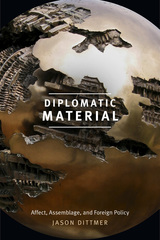
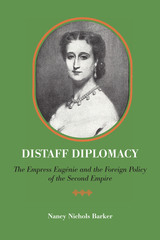
The Empress Eugénie, wife of Napoleon III and one of the most beautiful women ever to grace a throne, was the victim of her own inconstant mind. A daughter of an aristocratic Spanish family, she had a natural reverence for legitimate monarchy; yet her high-spirited temperament and chivalric outlook made her admire instinctively the boldness and aura of glory that she associated with the Napoleonic empire. The incongruous principles of Legitimism and Bonapartism battling within the Empress produced in her a double-mindedness that had tragic consequences.
The Empress has always been a controversial figure. Her enemies have blamed her the fall of the Second Empire and the defeat of France; her admirers have disclaimed for her any part in the mistakes that led to the disastrous Franco-Prussian War of 1870. To determine the actual role that Eugénie played, Barker, using material from public and private European archives and a wide range of published works, examines in Distaff Diplomacy the development of the Empress' views on foreign affairs and ascertains their effect on the formation of the policies of the Second Empire.
Eugénie's influence fluctuated widely over the years. As a bride she was neither interested in nor knowledgable about foreign matters; as a middle-aged woman, in the late years of the Empire, she was discredited by her past errors, but she continued to pull strings outside of normal diplomatic channels. Her most sustained and effective work, from 1861 to 1863, was largely the inspiration for a grand design to remake the map to assure French hegemony in Europe and to establish an empire in Mexico. The success of this design rested on an Austro-French alliance; but the design itself, reflecting the Empress' incoherent thinking, contained the fatal inconsistencies that made Austrian rejection of it inevitable. Since the Mexican expedition and the diplomatic muddle of 1863 were the watershed from which the subsequent troubles of the Empire flowed, the Empress must be held responsible for seriously undermining the foreign policy of the Empire. Despite Eugénie's many fine qualities—her generosity of spirit, her splendid courage, and her moral integrity—her diplomatic efforts, affected as they were by her background, temperament, state of health, and changing moods, did not amount to statesmanship. This first systematic examination of the Empress' influence on foreign policy delves deeply and carefully into the subject.
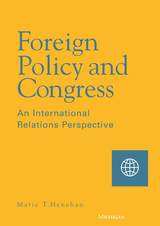
In recent years political scientists have begun to consider the impact of the international system on domestic policy. Part of the difficulty of some of this work, as well as work on Congress's role in foreign policy, is that it has been limited in terms of time and the number of events the analysis considered, depending on case studies. This book offers a systematic consideration of the effects of international events on domestic politics, crossing many different kinds of international activity, and provides a unique longitudinal view of Congressional action on foreign policy.
This book will be of interest to scholars of international relations, American foreign policy making, and Congress.
Marie T. Henehan is Assistant Professor of Political Science, Vanderbilt University.
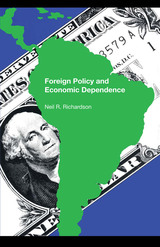
In an era of increasing interdependence among nations, the foreign policies of poor countries are becoming a subject of critical interest to scholars and the public alike. Neil R. Richardson adopts a political economy perspective to examine the foreign policy repercussions of international economic dependence.
Are dependent countries compliant in their foreign policies, acquiescing to the preferences of the industrial giants on which they rely for foreign trade, investment, and aid revenues? Or are they instead prepared to defy their dominant economic partners? These are the major concerns of Richardson’s rigorous investigation.
The book begins with a characterization of economic dependence and its possible impact on the foreign policy decisions of dependent governments. Ideas from both “interdependence” and dependencia scholarship are extracted in order to explain the reliance of poor countries on their rich partners. These economics are linked to the foreign policies of poorer countries by considering how the mechanisms of dependence may create pressures on foreign policymakers. Several combinations of pressures are plausible, and each set yields a differing expectation about their foreign policies.
The second part of the book is an empirical test of these foreign policy predictions for the years 1950–1973. Richardson analyzes the foreign policy behavior (as reflected in certain votes in the United Nations General Assembly) of a number of poor countries that are economically dependent on the United States to varying degrees.
The results suggest several surprising conclusions. Contrary to one common assumption, these mostly Latin American and Caribbean countries are not necessarily locked into a condition of perpetual dependence. Richardson finds that the foreign policies of the economic dependencies are not easily manipulated by the United States. Not only do annual changes in their external economic reliance fail to correspond to their U.N. voting behavior, but the dependencies as a group are no longer clear voting allies of the United States after the late 1960s. These and other results bear theoretical and policy implications that conclude the book.
Foreign Policy and Economic Dependence will be of interest to specialists in quantitative international relations and American foreign policy.
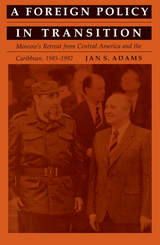
Jan S. Adams analyzes the factors shaping Gorbachev's foreign policy in Central America by surveying Soviet political views old and new, by describing Gorbachev's bold restructuring of the Soviet foreign policy establishment, and by assessing the implications of his policy of perestroika. A series of country studies demonstrates how changes in Soviet policies and domestic and economic circumstances contributed to significant shifts in the internal conditions and external relations of the Central American and Caribbean nations. Adams discusses in detail such topics as the reduction of Soviet military and economic aid to the region and pressures exerted by Moscow on client states to effect the settlement of regional conflicts by political rather than military means.
The author concludes by speculating about which trends in foreign policy by Russia and other Soviet-successor states toward Central America and the Caribbean may persist in the post-Soviet period, discussing as the implications of these changes for future U.S. policy in the region.

The rise of the House of Saud in the mid-eighteenth century led to the creation of two successive Saudi states which were supported by two key groups, the religious Wahhabi and the dynastic Saudi. The central objective in the relationship between these groups was to convert the population to Wahhabism, with the Saudi dynasty providing the military and political power to wage wars of occupation and proselytism. The major conclusion of this book is that this relationship ceased to exist when Ibn Saud came out of exile in 1902 to establish the third Saudi state.
Jacob Goldberg's Saudi perspective, unlike the British perspective of earlier studies, focuses on the marked changes in the years from 1902 to the disappearance of the Ottomans in 1918. Ibn Saud had spent his formative years in exile in Kuwait, witnessing the international politics and intrigues of that region. When he returned to head the new Saudi state, his goal was the reinstatement of the House of Saud in Arabia and the restoration of its former dynastic dominions, but not the propagation of the Wahhabi doctrine. Territorial ambitions were modified by considerations of realpolitik. This pragmatic reversal accounts, in part, for the ability of the new state to survive.
By focusing on the roots of Saudi foreign policy, the author highlights the distinctive characteristics that make Saudi Arabia inherently different from other Middle Eastern states.
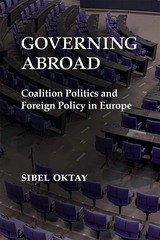
From Austria to New Zealand, coalition governments often pave the road to foreign policy. In Western Europe, nearly 90 percent of postwar governments include two or more political parties. Israel, the Middle East’s only consolidated democracy according to many, has never experienced single-party rule in its history. Even the United Kingdom, known for its long streak of single-party rule, now navigates multiparty cabinets. Coalitions are everywhere, but we still have little understanding of how they act in foreign affairs. History shows that coalitions can sometime engage in powerful international commitments such as participating in military operations, but at other times, they postpone their decisions, water down their policy positions, or promise to do less than they otherwise would. What explains these differences in behavior?
Governing Abroad unpacks the little-known world of coalition governments to find out. Oktay argues that the specific constellation of parties in government explains why some coalitions can make more assertive foreign policy decisions than others. Building on the rich literature in political science on coalitions, legislatures, and voting behavior, the book weaves together sophisticated statistical analyses of foreign policy events across thirty European countries alongside in-depth case studies from Denmark, the Netherlands, and Finland. It brings political parties back into the study of foreign policy, demonstrating that the size of the coalition, the ideological proximity of the governing parties, and their relationship with the parliamentary opposition together influence the government’s ability to act in the international arena. This book challenges our existing perceptions about the constraints and weaknesses of coalition governments. It sheds new light on the conditions that allow them to act decisively abroad.

“In the annals of American diplomacy, the presence of George F. Kennan stands tall and daunting, a figure of articulate intelligence who thought about the action but also beyond it. He was not always a great diplomat, for his imagination was lively, and he lacked the self-effacing patience which is so essential to the profession at its most mundane; but he was a great analyst and policymaker, one of the very few this country has produced in foreign affairs, perhaps finest since John Quincy Adams.”
Thus begins Anders Stephanson's penetrating study of this complicated, often controversial, yet highly respected public man. From an array of intellectual reference points, Stephanson has written what is not only the most serious assessment of Kennan to appear but is also a work of general significance for a wide range of contemporary issues in foreign and domestic politics and culture. Appropriately, the book's emphasis is on Kennan's lifelong attempt to grasp Soviet foreign policy and devise an effective American response, particularly during the decisive period around the Second World War when the contours of our present world order gradually emerged: the period of wartime alliance with the Soviet Union, the ensuing “containment” policies and division of Europe and much of the world into hostile blocs. Stephanson also examines Kennan's strategic vision, his “realistic” approach to foreign policy, and his disdain for the Third World.
An extended final section, “Class and Country,” then situates Kennan as an essentially European kind of “organicist” conservative with no obvious political home in American society, a society manifestly unorganic in all its mobility and mass culture. An outsider without class attachment, he could never reconcile his dislike of American politics and culture with his attachment to values of order and hierarchy. These warring sensibilities produced, for example, vehement denunciations of McCarthyism as well as of the student revolts of the following decade. Yet it was Kennan's marginality, his functional detachment from domestic politics, that made possible his often clairvoyant analyses of foreign affairs.
Stephanson's work is an unusually broad and deep characterization of a reflective, sometimes enigmatic but always outstanding American policymaker and man of letters.

In 1624 James I invited Parliament to discuss issues of war and peace, setting a precedent which would make yet another inroad into the ancient prerogatives of the crown. The so-called “Happy Parliament” dismayed the peace-loving King by supporting Prince Charles and the Duke of Buckingham in their demands for war with Spain.
Robert Ruigh presents an absorbing and authoritative analytic narrative of the proceedings between Parliament and the crown and their far-reaching constitutional and political consequences. His use of fifteen parliamentary diaries and other contemporary manuscripts has resulted in a balanced account which avoids the tendency to vilify the Stuarts and glorify the Commons, and which provides an integrated and perceptive picture of the Parliament. He presents an analysis of patronage in relation to the composition of the Commons and a reevaluation of historical generalizations about the senility and ineffectuality of King James during his declining years, the seizure of power by the Duke and the Prince and their management of Parliament, the precedent of free speech in foreign affairs, and the effect of Parliament on contemporary politics.
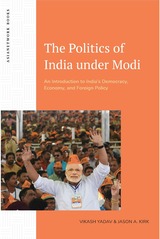
Since the right-wing, Hindu-nationalist government of Narendra Modi’s Bharatiya Janata Party (BJP) came to power at the national level in 2014, and with its consolidation of power in the 2019 general election, India has witnessed a significant realignment of its national politics and a shift toward the right of the political spectrum. The Politics of India under Modi provides a detailed overview of India’s political trends, economic prospects, and international relations in the twenty-first century.
This book is designed as a supplement and update for existing syllabi that trace India’s political economy from the birth of the republic to the quest for economic liberalization and great power status. Undergraduates and scholars interested in India’s foreign policy and political reform will find value in this timely book.
“The subject of this book is extremely compelling and important, as well as timely. BJP rule and the Modi regime, it is now clear, represent some critical turning points in Indian politics, which have yet to be analyzed in depth academically by experts. I see this book as a key first step in this process.”
-Rina Verma Williams, School of Public and International Affairs at the University of Cincinnati
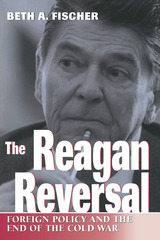
It is often assumed that Ronald Reagan's administration was reactive in bringing about the end of the cold war, that it was Mikhail Gorbachev's "new thinking" and congenial personality that led the administration to abandon its hard- line approach toward Moscow. In The Reagan Reversal, now available in paperback, Beth A. Fischer convincingly demonstrates that President Reagan actually began seeking a rapprochement with the Kremlin fifteen months before Gorbachev took office. She shows that Reagan, known for his long-standing antipathy toward communism, suddenly began calling for "dialogue, cooperation, and understanding" between the superpowers. This well-written and concise study challenges the conventional wisdom about the president himself and reveals that Reagan was, at times, the driving force behind United States-Soviet policy.

In 1904 a small, distant war brought Russia to the brink of internal collapse—and yet within ten years the country embroiled itself in an incomparably larger conflict close to home. How the war with Japan and its aftermath actually steered Russia toward such an unlikely, fateful decision is the subject of David McDonald’s book, a remarkable analysis of Russian foreign policy on the eve of World War I.
The revolutions that followed the Russo-Japanese War confirmed for Russian statesmen their belief that complications abroad threatened the domestic order. McDonald shows how this perceived connection prompted the institutional measures intended to minimize the risks of foreign entanglements, principally the reform of Council of Ministers as a “United Government” that would share the emperor’s role in forming foreign policy. These measures, as McDonald demonstrates, had a decisive effect on Russia’s restrained response to trouble in the Balkans, and consequently, on the course of world history.
McDonald’s analysis integrates the history of Russian foreign policy at this critical juncture with accounts of the “crisis of autocracy” that marked the early twentieth century. Depicting Nicholas II’s struggle with his ministers over the direction of foreign policy, the book offers insight into the evolution of the bureaucratic state and its relation to domestic society in late imperial Russia.
READERS
Browse our collection.
PUBLISHERS
See BiblioVault's publisher services.
STUDENT SERVICES
Files for college accessibility offices.
UChicago Accessibility Resources
home | accessibility | search | about | contact us
BiblioVault ® 2001 - 2024
The University of Chicago Press









